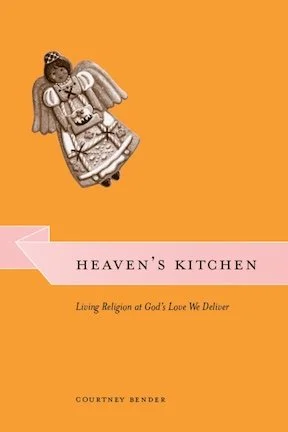Going For It
Courtney Bender
October 9, 2025
Marshall McLuhan famously steps out of the shadows in Annie Hall to put an end to the yammering-on of a Columbia professor who is trying to impress his date as they stand in a movie theater line. “You know nothing of my work!” McLuhan deadpans. It’s such a funny, perfect scene. And easy enough for readers of American Religion to feel themselves caught on both sides of the exchange—both the reader and the read. More than twenty years after the publication of my first book, Heaven’s Kitchen: Living Religion at God’s Love We Deliver (University of Chicago Press, 2003), I have often felt like a McLuhan speaking to myself. I know nothing of my work! In those twenty-plus years it has been cited and read in ways that I would never have imagined. I frequently ponder now how a book that aimed to answer discrete questions challenging a specific sociological argument that flared in the 1990’s still has readers today. Why? What do they learn from it? What work does it do? I cannot venture a good answer. It’s had its own career beyond me or my thinking. I’ve moved on and so has the book. This makes it interesting and challenging to answer the questions posed by the journal’s editors for Back Pages: “How we would approach the topics of our first books today. What holds up? What should change? What are the stakes now as opposed to then?”
Heaven’s Kitchen investigated how people talk about and practice religion in everyday life. This investigation was based in an ethnography of an AIDS organization in New York City in the 1990’s called God’s Love We Deliver. I wanted to show how people understood their work in religious terms and, if they did, what they identified as religion—how they navigated talking about things that mattered in public life (we might call these “third spaces"). The crux of the problem I was addressing was not small.
My theoretical questions swung big in the sociological field of the day: I wanted to challenge arguments about the presence and impact of religion in public life. I brought interests in cultural sociology and theoretical insights from Bourdieu and Bakhtin to bear. I argued that in volunteering at an AIDS organization in New York and listening and thinking about religion I could develop a counterargument. Everything was out of proportion in terms of fit of questions to method, theory to design. It was an unwieldy mess and up until the bitter end I had a hard time explaining clearly what I was up to, what the stakes were, how my questions mattered.
By the time Heaven’s Kitchen was published I was well are of its limits. I had received much advice. From the start, my mentors encouraged me to extend my ethnographic work from kitchen and vans of God’s Love We Deliver (GLWD) to other lived spaces in volunteers’ lives—home, clubs, gym, work, etc. I had pitched just that—an expansive, ambitious ethnographic project at the proposal stage, and I think it was that ambition that won them over to approving it. But this plan proved unfeasible—it was, in fact, an impossibly ambitious research plan for any single ethnographer to do. Other professors in Princeton’s Sociology department were more skeptical—even critical—of the research I ended up doing. A single-site ethnography seemed not very scientific to them. To make it a real study I was going to need to compare my findings at another site or learn some statistics and build out some generalizable contributions. This point was later made by reviewers at the press that first read the manuscript. They convinced the editor to pass on the book. One of the reviewers said that the manuscript had no findings but maybe there was a journal article in there somewhere.
But then the book was published, and then it was read, and it was assigned, and portions of it were excerpted in other readers, and it even won a prize. All the criticisms that I had heard about Heaven’s Kitchen moved along with it, and the limitations of the book’s mismatch also followed along with it: the enormous mismatch between my theoretical critique of the field and my proposed interventions and my fieldwork. I ended up writing a book that people wanted to read not because of but perhaps despite the specificity of its arguments. Perhaps? In any case, it remains tempting to say that I know nothing of my work!
Thus, to answer the questions of what holds up, and how I would approach the same topics today differently: the questions that animated Heaven’s Kitchen seem antique and are not ones I would approach today. Religion speech and practice in public life is everywhere; its contours demand different questions than the ones I asked. But at the same time, the book has yielded some stuff that scholars and students find interesting and helpful in ways that I could not have anticipated. I don’t think authors have much control over these things—you will not find me stepping out from behind the curtain to tell you that you know nothing of my work.
But to the question of what I would change? Well, that is another matter. In my desk drawer I have a piece of writing—nearly chapter length—that I often think could have been, should have been, in Heaven’s Kitchen. It has an experimental tone and style. I recall that I wrote it quickly, the style and structure coming all at once in a way that infrequently happens but when it does, signals that you’re writing something good. The pages tell a story that took place over a few days in the GLWD offices while I was volunteering there. In the late winter we were all thrown into a stir when one of the mainstay staff members learned—or did he?—that his brother had committed suicide. He was estranged from his family; it might have been a lie. A kind of lie that stood in for something else, and that what was really bringing him low was that he had just learned that he was HIV+ —or had he? That also may have been not a true interpretation, though it seemed that many believed it to be so. The crises of care that reverberated throughout the small coterie of committed people who worked together were at the heart of these pages. It was a story that was built on gossip and intimacies and discretion. It was a story about how even at an AIDS organization in New York in the 1990’s there were deep abysses of shame and secrecy that could abruptly swallow anyone. The story as I told it was all hints followed by guesses, and it was about how potent lies and possible lies are and how they can communicate truths when the truth cannot be borne. In these pages I was writing about care and people who resisted care. I was writing about my own bewilderment. In those pages I wrote about race, drugs, and sex in ways that I did not figure out otherwise how to bring into my sociological book.
As I was writing, it was clear that this piece could not belong in Heaven’s Kitchen. It didn’t even make it into the dissertation. It seemed to belong to something else—some other, some future or parallel project. One that I might have had in me but that was going to take me on another track—who knew where? Once I finished Heaven’s Kitchen, I tweaked those pages and sent them to a journal. Reviewers informed me that I could not build social scientific knowledge on the possible lies that people told, or on the ambiguities of interpretation through which I had experienced and lived in the world. One reviewer suggested I follow up with the people at GLWD and ask them what really happened, what the real story was. The pages went in the drawer, and I wrote The New Metaphysicals: Spirituality and the American Religious Imagination (University of Chicago Press, 2010).
Today, our field is more receptive to experimentation. Or at least we aspire to be. But I am goaded by those pages even now. If I had included them in Heaven’s Kitchen, they would have exposed just how chaste my research questions were. It would have exploded the book that I wrote and published. It would have set me off the grooves where I was aiming and where my expertise was beginning to develop and set me on another and unclear path. Heaven’s Kitchen is a book I am still proud of. But the pages in the drawer make me wonder about how many of us are holding onto pages like that. How many of us have pages in us that are really pushing us to do something differently and use our ways of knowing in the world to say something else. The ones that don’t fit, that don’t seem to click with the bigger project whatever it is. Or that seem a bit off in their interpretation, too weird, or out of step with whatever the going view is on what religion means in America today. Pages urging us to speak about things we understand but don’t fully know, urging us to trust ourselves a bit more but also not too much. None of us in the end can know the meaning of our work, so maybe we should just go for it.

